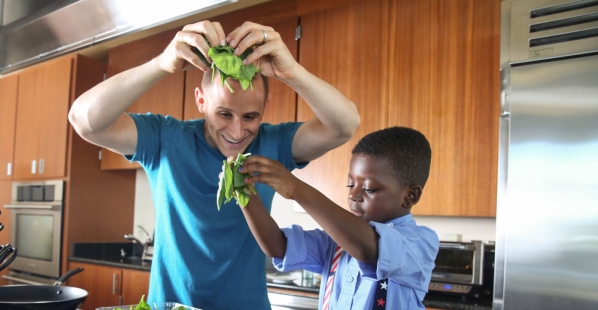Advocate for Animals At School: Talk to Your Child’s Teacher
We know our children’s schools are doing their best to provide a high-quality education, but we also know that even with the kindest of intentions, sometimes they miss the mark by offering experiences that fail to consider animals’ well-being. That’s why it’s important to talk to your child’s teacher about what they can do to advocate for animals in their classroom.
Whether you’ve received notice that your kid’s class is planning to take a field trip to a roadside zoo, acquire a “class pet,” hatch chicks, host a “donkey basketball” fundraiser, or dissect animals, you can help make a difference for sentient beings by voicing your concerns to your child’s teacher.

You’ll likely have a worry or two at some point during your child’s education, so consider becoming active in the Parent-Teacher Association (PTA). By getting involved, you’ll have the support of the entire PTA behind you when addressing any concerns with the school. Even if your schedule doesn’t permit attending meetings or serving on the board, contributing however you can will make an impact. You can volunteer as a chaperone for a dance or bake vegan cookies for fundraisers—whatever aligns with your skills and availability.
Five Steps To Talk to Educators About Animal Advocacy
The five steps below can help you open a dialogue with teachers or administrators in order to bring about change that will benefit students and animals—something we like to call “feeding two birds with one scone.” Chances are that other parents have the same concerns you do but may feel hesitant to speak up, so you’ll be helping them, too!

Here’s what to do:
- Talk to your child’s teacher directly, expressing your concerns and offering them additional information that supports your request for an animal-friendly classroom. You can connect with them in person, over the phone, or via e-mail—the important thing is to speak respectfully, offer helpful resources, and have confidence that you can help bring about change, as many others have. Feel free to contact us for help with talking points and letter templates. Sometimes, this is the only step you’ll need! Your child’s teacher may be grateful for your help and relieved to know that a caring guardian like you supports them.
- If your child’s teacher is unreceptive, you can connect with another trusted staff member—such as a counselor or the principal—about the issue and your ethical concerns. You can encourage them to check out TeachKind, PETA’s humane education division, for support with animal-free alternatives and replacements that meet curricular goals without harming anyone.
- You can order free stickers, comics, and leaflets to share with your child’s class. These resources will help them see animals as the individuals they are, each with their own unique personality, wants, and needs.
- Creating a petition to gather the signatures of fellow parents and community members in support of your request is a great way to make your message heard and lend it more weight when you present it to the appropriate decision-maker at your child’s school.
- If teachers and other staff members are unresponsive or refuse to enact change, e-mail us at PETA Kids so we can help.

Animal Advocacy: Parents’ Stories
Other parents have gotten changes made by speaking up, and you can, too! James, for example, discovered that a petting zoo had been brought to his children’s school during Spirit Week celebrations. He sent an e-mail respectfully voicing his concerns to the dean of students, who then made the compassionate decision to remove the exploitative installation. Another parent, Rick, spoke up after his son’s school choir performed a song featuring lyrics that trivialized animal abuse and succeeded in having it removed from future performances. And Katie supported her daughter, Kayla, in speaking up after finding out about a chick-hatching project taking place in her kindergarten classroom—you can watch their inspiring interview for a confidence boost:
We want what’s best for our young ones, and helping them see that everyone, regardless of species, deserves respect is a lesson that prepares them—and the world—for a more peaceful tomorrow.
*****
Is your child vegan? Don’t forget to chat with their teacher about how best to support them at school:





Under 13? Ask your parents bee-fore you continue!